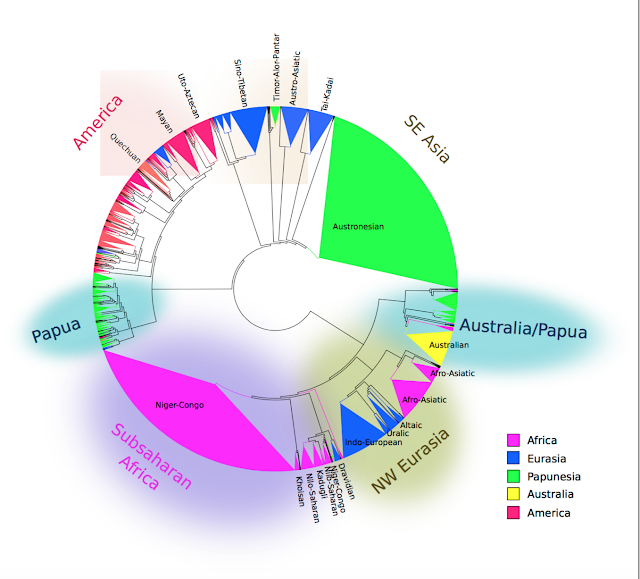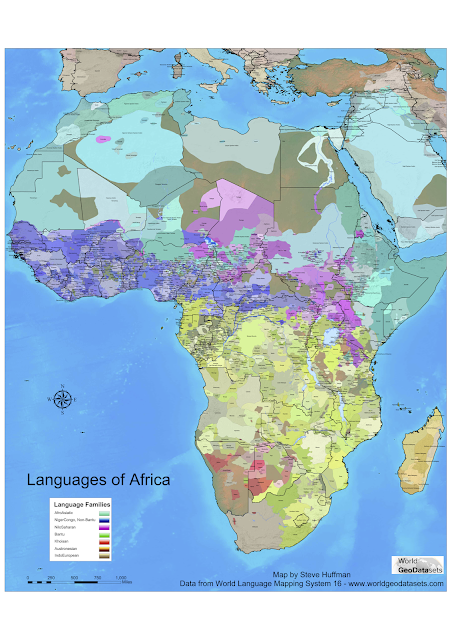On the previous post on language endangerment - comment and response
The previous post that was on language endangerment got a lot of spread on tumblr (and elsewhere it would seem). Please note that I made some edits to the text early on, the latest version of any post can always be found on the blog on blogspot.
There was one comment by Language village that I thought I'd respond to.
Why? Why must we think of ourselves (our “linguist selves”) as scientists and not something else? Why not humanists? or philosophers? or— especially in the case of language endangerment— advocates?
Why must we be scientists and not advocates? A language in itself— the thing that is endangered, that is devalued, that is crucial to cultural identity— cannot speak for itself. While the native speakers of a language certainly have “first access” to defending their language, is it right to give them sole access? Do regular— non-linguist— speakers have the training, the background, the experience necessary to advocate for their own language? Often they do not. Is it responsible to benefit from a position (English speaking, in the case of this post) that has created the discourses and policies that lead to language endangerment, to purposely rob a people of their language by browbeating them with an ideology of [English] superiority, and then to simply accept this brainwashed whitewashing when it is parroted back to us? No, it is not. Sometimes we are scientists, but as scientists with specialized knowledge and expert understandings, we must also be advocates. Who better to advocate for the endangered species than an environmental science scholar? Therefore, when a community says “this is our language and we don’t want your help preserving it” it actually IS our place to argue otherwise. We can’t (and shouldn’t!) force language preservation or revitalization on a people, but we can argue for it— loudly and vehemently— even with native speakers of said language. Because we are not always ONLY scientists, sometimes we are educators, and very often we must be advocates. We must speak up in the defense of language if no one else will or our positions mean nothing.
I agree, at least to a certain extent and I apologise if that didn't come across. This is exactly why I wrote that we as privileged people have so much to give back, that we must insist on spreading the knowledge of linguistic equality in these communities, to try to install pride and knowledge and that we mustn't shy away from having these discussions just because the oppressive structures have been internalised by the language users. I think these are very crucial points and essentially the same as what is being stressed in the comment here, I apologise if they didn't come across clearly enough.
However, and here we also agree - we mustn't let this become guilting and shaming - it won't do any good and most likely actually be counter-productive. I think we can argue these points without being paternalistic and, in fact, I think most linguists do, but it is always something to be aware of and something that needs to be made explicit when we talk of language endangerment to the broader public. There are, seriously, people who ask if users only revitalise their language because linguists have told them to.
It is also extremely important not separate language endangerment out as an independent phenomena, it is not and this is an issue that usually isn't discussed. Species are different from languages, languages have users and these users live in societies, they need access to education, a living wage etc. It is naive to isolate language endangerment from the other oppressions faced by the communities. Linguists can be advocates for linguistic diversity and against language extinction, but to focus on language only when it is only one of many challenges faced by the community doesn't make sense to me. This is why I wrote that we can participate in the struggles against all kinds of oppression faced by the communities, including but not restricted to language endangerment.
Linguists have a special role to play in the fight against the oppression of these communities considering our special skill set, no doubt, but to treat language endangerment as an independent phenomena is missing the larger picture - even if you cannot address the larger picture directly you can at least acknowledge its existence.
Also, it is important to remember that we need not remain the only ones with this skill set - we can try and pass on those skills to others who do not have access to this kind of schooling so that they can actively participate in the research of communities - their own or others in the country. We need more non-WEIRD people doing linguistics. Granted, this is probably often more effective strategy among already well-educated urban people of the same country.
I believe that we have much to learn from anthropologists here. My understanding is that they have been having discussions on participatory/activism & research versus objective outsider research much longer than linguistic fieldworkers - I want to read more on this from them.
I hope this was useful and I thank you for an interesting discussion.
There was one comment by Language village that I thought I'd respond to.
Why? Why must we think of ourselves (our “linguist selves”) as scientists and not something else? Why not humanists? or philosophers? or— especially in the case of language endangerment— advocates?
Why must we be scientists and not advocates? A language in itself— the thing that is endangered, that is devalued, that is crucial to cultural identity— cannot speak for itself. While the native speakers of a language certainly have “first access” to defending their language, is it right to give them sole access? Do regular— non-linguist— speakers have the training, the background, the experience necessary to advocate for their own language? Often they do not. Is it responsible to benefit from a position (English speaking, in the case of this post) that has created the discourses and policies that lead to language endangerment, to purposely rob a people of their language by browbeating them with an ideology of [English] superiority, and then to simply accept this brainwashed whitewashing when it is parroted back to us? No, it is not. Sometimes we are scientists, but as scientists with specialized knowledge and expert understandings, we must also be advocates. Who better to advocate for the endangered species than an environmental science scholar? Therefore, when a community says “this is our language and we don’t want your help preserving it” it actually IS our place to argue otherwise. We can’t (and shouldn’t!) force language preservation or revitalization on a people, but we can argue for it— loudly and vehemently— even with native speakers of said language. Because we are not always ONLY scientists, sometimes we are educators, and very often we must be advocates. We must speak up in the defense of language if no one else will or our positions mean nothing.
I agree, at least to a certain extent and I apologise if that didn't come across. This is exactly why I wrote that we as privileged people have so much to give back, that we must insist on spreading the knowledge of linguistic equality in these communities, to try to install pride and knowledge and that we mustn't shy away from having these discussions just because the oppressive structures have been internalised by the language users. I think these are very crucial points and essentially the same as what is being stressed in the comment here, I apologise if they didn't come across clearly enough.
However, and here we also agree - we mustn't let this become guilting and shaming - it won't do any good and most likely actually be counter-productive. I think we can argue these points without being paternalistic and, in fact, I think most linguists do, but it is always something to be aware of and something that needs to be made explicit when we talk of language endangerment to the broader public. There are, seriously, people who ask if users only revitalise their language because linguists have told them to.
It is also extremely important not separate language endangerment out as an independent phenomena, it is not and this is an issue that usually isn't discussed. Species are different from languages, languages have users and these users live in societies, they need access to education, a living wage etc. It is naive to isolate language endangerment from the other oppressions faced by the communities. Linguists can be advocates for linguistic diversity and against language extinction, but to focus on language only when it is only one of many challenges faced by the community doesn't make sense to me. This is why I wrote that we can participate in the struggles against all kinds of oppression faced by the communities, including but not restricted to language endangerment.
Linguists have a special role to play in the fight against the oppression of these communities considering our special skill set, no doubt, but to treat language endangerment as an independent phenomena is missing the larger picture - even if you cannot address the larger picture directly you can at least acknowledge its existence.
Also, it is important to remember that we need not remain the only ones with this skill set - we can try and pass on those skills to others who do not have access to this kind of schooling so that they can actively participate in the research of communities - their own or others in the country. We need more non-WEIRD people doing linguistics. Granted, this is probably often more effective strategy among already well-educated urban people of the same country.
I believe that we have much to learn from anthropologists here. My understanding is that they have been having discussions on participatory/activism & research versus objective outsider research much longer than linguistic fieldworkers - I want to read more on this from them.
I hope this was useful and I thank you for an interesting discussion.



Comments
Post a Comment